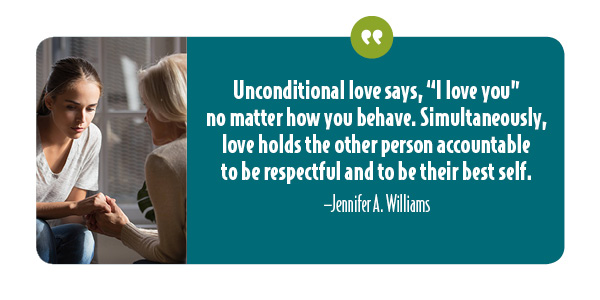Being a parent is difficult and complicated. On top of parenting being a full-time job, it costs an estimated quarter of a million dollars to raise each child to the age of eighteen. We dedicate ourselves to keeping our children safe and healthy for nearly two decades—a huge feat in this crazy world. Even after they’ve grown up, we have heartstrings connected to them 24/7, no matter where they live or what they’re doing.
It can really hurt when we unexpectedly find our adult child disrespecting us or our relationships with our children strained. Do you think to yourself, "Why is my grown son so mean to me?" or "Why is my grown daughter so disrespectful to me?" Or are you feeling "used" by your children? Perhaps, it feels like they only contact you when they need something.
Estimated reading time: 8 minutes

Table of Content
Grown Children Disrespecting Parents—What's Up with Disrespectful Behavior?!
Reasons Why Grown Children Are Disrespectful to Their Parents
The Impact of Mental Health on Young Adult Behavior
What Is Your Grown Child Trying to Tell You?
If You Feel Used by a Family Member or Adult Child
Navigating Estrangement: Steps to Reconnect with Your Adult Child
How to Parent Grown Children: 3 Critical Actions to Eliminate Disrespect
Action 1: Seek to Understand
Action 2: Repair the Relationship
Action 3: Set Healthy Boundaries
13 Strategies to Effectively Handle Disrespect from Your Adult Children
Closing Thoughts
Grown Children Disrespecting Parents—What's Up with Disrespectful Behavior!?
You’ve done your best as a parent. Maybe you’ve made a few mistakes; perhaps you didn’t have great parenting yourself. Nonetheless, you loved and still love them, and hopefully, your children know that.
You believe that you taught the importance of respect throughout their developmental years, too. When you have disrespectful from your grown children, it can be painful and discouraging.But then you find yourself the target of your grown child’s anger, snide remarks, entitlement, and disrespect. Ouch.

So how do you hold your adult child accountable to be loving while also letting them know how much you care?
As parents, with everything we’ve given to our children over the years, it can feel like the least we can expect is a little respect, right? And it can even feel like our child only comes calls or visits when they "want" something. Yep, we can feel used by our daughter or son.
A reasonable expectation, no matter how flawed. Why is it a faulty expectation?
Because parents are meant to be a safe zone. We are a secure place for our children to erupt because they know we’ll always love them. This understanding doesn’t mean disrespect and angry zingers feel good on the receiving end. Nor does it mean that the behavior is acceptable; it is, however, understandable.
First off, remember that just because your grown child is acting disrespectful, or perhaps having an off day, it doesn’t mean you’ve done something wrong as a parent.
Nothing gives them the right to mistreat you.
Respect is non-negotiable.
All disrespect requires healthy boundaries though. Do you know who to set them?
If your child is disrespectful in young adulthood, there can be a multitude of reasons. It’s best to seek to understand their disrespect and have an open and honest conversation with them.
Your desire to make sense of your relationship now is probably what brought you here, right?
Related reading: "How to Effectively Respond to Disrespectful Stepchildren in a Blended Family."
.jpeg?width=1254&name=Closeup-of-man-with-father-looking-Compresseed-173840532_1255x837%20(1).jpeg)
Possible Reasons Why Grown Children Are Disrespectful to Their Parents
Before we get into how to deal with disrespect in your parenting, or perhaps even anger, let’s explore some possible reasons for your grown child’s behavior:
- Living on their own is much harder than they thought it would be, and they resent you for not preparing them better.
- They never learned how to regulate themselves or process emotions adequately.
- They’re being treated disrespectfully at work and are taking it out on you—a cry for help.
- They’re overwhelmed with big feelings, and you’re a safe space for them to vent.
- The pain from the divorce of their parents left them feeling hurt, confused, and angry. Or being part of a blended family is overwhelming, and they need help.
- Disrespect is more comfortable than engaging in challenging and necessary conversations.
- Something is bothering your adult child, but they haven’t acknowledged it. Or something happened that upset your adult child, and they don’t know how to deal with it. Disrespect can be an S.O.S.
- They want to talk to you about a vulnerable feeling, yet they don’t know how to broach the subject.
- As adults, they’ve realized some of their unresolved pain or emotions stem from things you did and said or didn’t do or say.
- You're coddling your adult child, or they were pampered as children. creating an unrealistic view of the world and they’re angry that they don’t get coddled anymore.
- Your grown child is a parent him or herself and overwhelmed with life and could be struggling with mental health issues.
- It's possibly they have
- They feel criticized or judged by you, and disrespectful behavior is their armor.
- They felt controlled as a child, and now as an adult, you can no longer control them.
My point is that there are as many reasons as there are cornstalks in an Iowa cornfield.
Each parent-child relationship is unique and parenting your adult child will depend on many things. Every upbringing is different, and no solution is one-size-fits-all. So be patient with yourself and in the parent-child relationship.
Regardless, disrespect is a red flag. When disrespectful adult children are causing heartache, it tells us as parents that something is needed, like a boundary or a heart-to-heart conversation.
And more recently, I've seen a new and concerning trend in mental health issues of young adults spilling over to parents inadvertently.
The Impact of Mental Health on Young Adult Behavior
It’s impossible to ignore the role that mental health can play in how our adult kids interact with us. Often, what surfaces as disrespect actually has roots far deeper than just a bad mood or rebellious streak.
Sometimes, specific mental health conditions are in the mix, fueling reactions neither you nor your child fully understand in the moment. Emotional struggles—such as anxiety, depression, unresolved trauma, or chronic stress—can shape a young adult’s behavior in ways that are neither obvious nor easy to untangle.
Sometimes, what a parent experiences as sharp words or distancing is really a sign that your child is overwhelmed, hurting, or still learning how to manage their emotional well-being.
Mental health challenges may also make it harder for your adult child to regulate their emotions, communicate effectively, or respond to conflict calmly. If they’re experiencing distress, it can spill over into your relationship, even if you’ve always been supportive. In some cases, underlying conditions may be undiagnosed or misunderstood, leading to reactions that neither you nor your child fully grasp at the time.
As a parent, it’s natural to feel hurt or confused by your child’s actions, yet recognizing there is often more beneath the surface can help us increase empathy, understanding, and patience.
Encourage them to accept support from a mental health professional or if they have an aversion to therapy, send them my way for EQ skills, such as mindfulness to support mental and emotional health.
Approaching these challenges together and maintaining your commitment to support them while also setting healthy boundaries, you create a foundation for deeper mutual respect and understanding.
Listen to Jennifer's podcast on Bite Your Tongue unpacking how to respond to disrespectful adult children and how to develop a healthy relationship..jpeg?width=1254&name=Having-a-family-debate-Compressed-480776281_1254x837%20(1).jpeg)
All Behavior Is Communication! What Is Your Grown Child Trying to Communicate?
Have you ever thought of behavior simply as communication?
It is beneficial to ask yourself, “What is my child trying to tell me through their behavior?”
All behavior is communication.
"Bad behavior" or “misbehavior” is primarily driven by unmet needs, lack of skill, and unprocessed emotion or pain. From this viewpoint, as parents, we can take a step back and get curious, even when we feel insulted by our children’s behavior.
Releasing judgment and looking at your child’s behavior in new ways will increase compassion and empathy. And when necessary, boundaries may be necessary, too.
Often, our adult children are a mirror of our collective investment in the relationship or lack thereof. Relationship health is always at risk if we do not honor, nurture, and fertilize it with love and respect.
How do you win back respect from your grown children if it's been lost?
Perhaps you might even feel your disrespectful grown child owes you an apology and you're stuck in a stalemate. Deal lovingly with disrespectful behavior, such as not returning phone calls, while also seeking to understand their perspective.
It can be a stark realization if we find out that our relationship isn’t as strong or healthy as we once thought, and it’s not what we desire it to be either. Every parent wants to stay connected and have a great relationship with their kids, no matter how old they are.
However, when our children are young adults, they expect the same respect anyone would require. If you want adult kids to respond to you lovingly or desire to spend time with you, it may be necessary to let go of unrealistic expectations and have an open and honest conversation.
Negative emotions in you or your grown child are a symptom of unresolved hurt or pain. Letting them know you care about their feelings and well-being can make a big difference.
Modeling healthy communication is key; you're still their parent. One thing is for sure, reciprocity and mutual respect are required.
Food for thought: "The Best Way for Adult Children and Parents to Communicate."
If You Feel Used by Your Family or Adult Child
One of the hardest relationship dynamics to navigate is when we feel used by our children or family members.
This behavior can be an adult taking what we do for them or giving them for granted. It can be a sense of entitlement or a lack of appreciation. They may continue to ask for favors, money, or babysitting without showing any gratitude.
I get it! These behaviors don't feel good.
Feeling used or taken for granted is a symptom of a larger problem.
The behavior is a symptom of our training. The blindspot for most people is an unawareness of how they might have contributed to being treated like this.
For instance, a simple example is a young child whining. If a parent gives them what they want while the child whines, they have just "trained" them to whine.
When we parent, we often do not think of the long-term outcome of tiny actions and responses over the years. Yet, the accumulation of many messages and parental responses download certain attitudes and behaviors in our children—like it or not!
From our perspective, we may see our behaviors as generous, helpful, or kind.
It's just what you do as a parent, right?
However, our giving may be overdone and enabling in an unhelpful way. Any resentment we might feel (and ignore) is a sign of this over-giving.
I've conducted many coaching calls on this very subject. One parent I spoke with continually bailed his son out and was consumed by anger and resentment. He wondered why his son wasn't financially mature or responsible yet continued to reinforce his irresponsible behavior without making that connection.
Here are a few of the comments I've heard directly from parents in my parent coaching sessions across the globe.
- "My son only contacts me when he wants something."
- My daughter is so rude to me after all I've done for her!"
- My daughter is out-and-out mean to me; it hurts so bad."
- "I sacrificed so much for my children and now they won't have anything to do with me."
- "My 21-year-old son is so angry—I just don't understand."
So, if you're feeling resentful or if you're getting unwanted behaviors from your adult children or other family members, ask yourself:
- "How might I be contributing to my grown child's behaviors?"
- "What can I do instead that would change our relationship interactions for the better?"
- "Is there a needed conversation that can to shift the dynamic?"
Raising your awareness of your impact instantly provides greater understanding and more compassion. It may be a hard pill to swallow AND totally worth the introspection.
Navigating Estrangement: Steps to Reconnect with Your Adult Child
When your adult child starts ignoring you, blocks you on their phone, or decides to disconnect and stop communications altogether, the emotions can be overwhelming. However, understanding the reasons behind their distance can be crucial in mending the relationship. Here’s a guide on how you might approach this delicate situation.
1. Acknowledge Their Feelings and Perspective
Begin by recognizing that your child’s reasons for the disconnect might be valid from their viewpoint, even though it may hurt to hear what they have to say. These reasons can range from unresolved past issues to a need for greater independence or autonomy.
By validating their perspective and emotions, you show that you respect their experiences and are willing to be in the relationship in a new way.
2. Approach Them with Empathy and Curiosity
Should you decide to reach out, do so with genuine empathy. Open the communication by expressing your willingness to hear and understand their perspective without judgment.
Your adult children are no longer obligated to live by your values or rules. Acceptance that they've chosen a separate path or have diverged from what you view to be best for them may be difficult, yet it IS part of an evolving and respectful relationship.
Use phrases like, "I may not have listened to you very well in the past, but I truly want to understand." or "Help me understand your viewpoint," or "How did you reach that decision?" to convey your intention to truly understand.
Learn and avoid feeling stoppers that block authentic communication. Check out our empathy workbook.
3. Respect Their Boundaries
It’s essential to respect their decision if they indicate a need for space. Sometimes, allowing them this distance demonstrates respect for their autonomy, which can be a pivotal step towards eventual reconciliation. Remember, space can often be a temporary necessity for reflection and healing.
As a parent, "space" even though sometimes necessary can feel like an eternity. Keep letting them know you're there whenever they're ready to talk or visit and no matter what they decide, you will always love them.
4. Be Patient and Hopeful
Healing takes time. Be patient with the process and maintain hope that with understanding and respect, the relationship may repair over time. Demonstrate through actions that you're committed to positive change, which can be reassuring for your child.
Navigating estrangement requires sensitivity, patience, and a willingness to understand. By acknowledging your child's feelings and demonstrating empathy, you can lay the groundwork for healing and reconnection.
How to Parent Grown Children: 3 Critical Actions to Eliminate Disrespect
Now, let’s turn our attention to specific solutions for disrespect in your relationships.
What can you do to shift the disrespect, heal, and increase greater understanding and closeness in the relationship? Making a conscious effort in the relationship can go a long way to resolution.

ACTION 1: Seek to understand.
Find out what’s going on with your child and what your child feels. Choose a good time to talk. Tell them what you feel and how their disrespect affects you.
Don’t try to address an issue on the fly, with divided attention, or when you’re already stressed. It’s essential to pick a good time that supports a successful outcome.
Many parents I've worked with have a difficult time initiating tough conversations with their children. They say that they are defensive and reactive, especially when their adult children express anger. A pattern may have formed and they think you're going to criticize them. Below are some openers that may help.
Icebreakers to Try
- “You may not realize how you hurt my feelings yesterday. Have I done something to upset you?”
- “I’d like to talk to you about something bothering me. Is now a good time?”
- “It’s so unlike you to be disrespectful. Is something wrong?”
Responses, expectations, and behaviors to avoid
- Name-calling.
- Broken promises and empty words.
- Harsh criticism.
- Saying hurtful things you might regret.
- Enabling your adult children financially, especially if they have an unhealthy addiction.
- Tolerating abusive treatment
- Expecting change overnight.
Related reading: "5 Parenting Tips to Successfully Deal with Disrespectful Adult Children."


ACTION 2: Repair the relationship if your child
feels hurt by something you did.
Most situations can move from strife and tension to closeness and understanding if we are willing to be open and lean into discomfort. You must lead the way to repair hurt and restore closeness.
When a parent takes responsibility for their part in a relation-SHIFT, it usually inspires the child to own their part. What you’ll often receive is a voluntary apology for their disrespect.
However, the more strained your relationship is, the more empathy and understanding you’ll need to provide when confronting disrespect. And sometimes, when there is deep hurt, you may have to keep trying repeatedly before they trust your gestures as sincere.
How Do We Repair Trust in a Relationship?
- First, admit your part as you see it. Answer your child’s questions honestly without defensiveness. (If you’re too upset, take a moment to self-calm and get in touch with what you love about your child before discussing further.)
- Next, empathize with how your action may have felt to your child.
- Then, ask what they would like in the future and if there is anything else that they need to restore the safety and trust between you moving forward. Apologize and commit to doing things differently next time.
The best way to teach a child respect is by modeling it—even when it’s challenging to do so.
Related reading: "How to Talk to Someone with Empathy—and What to Avoid!"
Empathy is a BIG key to healing relationships and resolving conflicts that seem insurmountable. One mother even said that what she learned saved her relationship with her daughter.


ACTION 3: Set a healthy boundary for disrespect
with your grown child.
A crucial action for any relationship is self-advocacy. It is not kind to us if we allow disrespect; therefore, we must set a boundary if we want a different result. Whatever we tolerate will continue. Think about it: It’s also not kind to our children to allow them to disrespect us because it teaches them it’s acceptable.
When our child disrespects us, it is our responsibility as a parent to hold them accountable to be better.
We can understand and empathize as a precursor, yet we must help them understand their impact and help them communicate in respectful ways.
Want more?
Here's a deeper look at other actions and strategies you can apply for a better relationship with your adult child.
13 Strategies to Effectively Handle Disrespect from Your Adult Child
Dealing with a disrespectful adult child can be challenging, but with the right approach, you can work towards a healthier relationship. Here are 13 strategies to consider:
1. Consider hidden stressors.
Sometimes disrespect masks deeper issues like stress or a cry for help. Be slow to judge or reach conclusions without speaking to your child. Investigate whether underlying factors might be driving your child’s behavior and consider seeking external support if needed.
Possible hidden stressors
- Marriage conflicts
- Parenting challenges
- Work unhappiness
- Health issues
- No work-life balance; working too much
- Financial problems
Don't assume the problem is you. You may be the safe zone for them. As we discussed earlier, all behavior is communication. Compassion is the shortest route to resolution.
2. Model respectful behavior.
Even when disrespected, responding with kindness and respect sets a positive example. Demonstrating the behavior you'd like to see can influence your child's actions in the future.
Now, I'm not suggesting allowing disrespectful behavior; however, if you can be firm AND kind, it will lay a stronger bridge for more meaningful conversations.
 3. Communicate clearly standards and behavioral guidelines.
3. Communicate clearly standards and behavioral guidelines.
Healthy boundaries create healthy relationships. Set clear guidelines for what behaviors are allowed and those that will not be allowed. Communicate firm boundaries with an emphasis on mutual respect and the importance of healthy communication.
Be sure and let your child know how precious the relationship with them is and the purpose of limits is to vouchsafe that parent-child relationship.
Examples of possible boundaries
- No yelling or raised voices.
- Respect the word "no."
- Adhere to agreements made together.
- Chip in and help with meals.
- Avoid swearing or name-calling.
- Speak directly with parents to resolve issues instead of venting to siblings or extended family.
Devise a list of your own and get really clear on the loving relationship you want to develop with your child in adulthood. Then, model that behavior.
4. Reinforce boundaries and follow through.
It's vital to enforce whatever boundaries you choose to set consistently. Consistency helps reinforce the importance of these limits. What we allow continues, so it's ineffective to set a boundary without backing it with action or consequences.
Address problems as they arise calmly and remind your child of the agreed standards.
5. Evaluate your expectations: Are they realistic?
Mindfully evaluate your expectations. Many times, parents use their own values as measurement without considering their child's values and what is important to them. Ensure fairness and accept that they are now adults and get to choose the values they will live by for themselves
Understanding the difference between disrespect and personal differences is crucial. Encourage open conversations and respectful discussions. Get curious about what respect means to them.
Disrespectful behaviors
- Name-calling or insults
- Angry shouting
- Dismissive remarks
- Ignoring boundaries
- All physical aggression
Acceptable behaviors
- Disagreeing respectfully
- Voicing concerns calmly
- Setting personal boundaries
- Requesting privacy and space
- Declining to visit when it interferes with work or other commitments
Keep in mind that everyone has a right to their emotional experience as long as it doesn't encroach upon personal space or hurt another person.
6. Stay calm or take a break to calm.
Before reacting to your child's disrespect, take a moment to self-calm. Nothing good comes from knee-jerk reactions that we frequently regret. This intentional choice to calm yourself helps maintain your composure, preventing an emotional or angry response that might escalate the situation.
 7. Listen and empathize ... and listen some more.
7. Listen and empathize ... and listen some more.
Show genuine interest in your child's perspective. Listen without interrupting or judging. Get to know them in a deeper way as adults. Empathize with their challenges and wait to give advice until you're asked.
Keep in mind that being empathetic doesn't mean agreeing with them; it's about acknowledging their feelings and understanding their viewpoint. These responses will help to strengthen your communication and connection.
8. Admit your mistakes.
Owning up to your errors can enhance trust. Apologize as needed to validate your child's feelings, showcasing that everyone makes mistakes.
We are all imperfect. Modeling humility when you make a mistake and being compassionate when your child makes a mistake promotes safety and openness in your relationship.
9. Address disrespect immediately... or as soon as you are calm.
When confronted with disrespect, calmly and lovingly highlight the issue and its impact. For instance, "It hurt my feelings when you didn't return my phone call."
When handling challenges in a timely way prevents feelings from building up and negative behavior from becoming a habit. It also shows your child that you care enough to hold them accountable to respect. Hint, hint: if you can't communicate respectfully, it's best to calm down first before initiating the conversation.
10. Focus on the now.
Handle disrespect by concentrating on the current situation rather than bringing up past issues. Placing your attention on what you are addressing in the present eases tensions and encourages more constructive communication.
11. Create a unified front.
Ensure you and your partner share a consistent approach to managing your child's disrespect. Being on the same page strengthens communication and eliminates a lot of pushback. This unity also helps to prevent family splinters created by triangulation.
12. Reflect on your parenting approach.
Consider how your parenting style might affect your child’s behavior. Parenting styles can be especially tricky if you co-parent in different parenting styles.
Another consideration is how your parenting style affected your adult child growing up. Was it too permissive that gave your children a false impression that they were in charge? Was your style controlling, and as adults they are now proving that you cannot control them anymore.
13. Understand the influence of your parental role.
Just because your kids are grown doesn't mean that they don't want to spend time with you or don't appreciate your input. Remember that you bring tremendous value as a parent—you hold their entire history! Who else in their life has walked by them their entire lives!?
Therefore, your perspective and input are unique. Yet, they are adults now. You must pivot your approach accordingly and respect their lifestyle choices and sincerely seek to understand them and their evolving identity.
You’re striving with the best intentions, and recognizing your efforts can provide comfort during stressful interactions.
By employing these strategies, you can work towards building a respectful and understanding relationship with your grown child.
Closing Thoughts
Disrespect causes static in any relationship, especially with those we love. And no one will tell you that disrespect is loving. However, big emotions sometimes erupt and disrespect is unintended.
Presume innocence. Seek to understand. And draw healthy boundaries.
Whatever way you decide to handle your grown child’s insolence, lead with love and empathy.
Your relationship with your child is precious, and they are now adults. Give them the respect you want in return.
Develop better boundaries—try out our online mini-course.
Frequently Asked Questions
How Can Family Support and Counseling Heal Disrespectful Patterns?
If you find yourself at a loss with ongoing disrespect or distance from your adult child, you don't have to navigate it without support. One of my cherished roles as a parent coach and emotional intelligence specialist is offering a structured, supportive environment where both you and your adult children can be heard, understood, and empowered to rebuild trust.
A skilled mentor acts as a neutral guide, helping all parties communicate honestly, listen actively, and break out of unhealthy cycles that may have formed over the years. Through this process, patterns of defensiveness, criticism, or withdrawal can be replaced with empathy, accountability, and healthier ways of relating.
How Does Family Therapy Work?
Emotionally intelligent approaches to family coaching are especially helpful for families wanting to repair old wounds, move forward, and develop new skills.
A typical family therapy process might include:
- Identifying and understanding emotional barriers between family members.
- Creating safe space for open dialogue.
- Addressing underlying hurts or misunderstandings from childhood or adolescence.
- Parental hurt and helping a young adult understand their impact.
- Learning practical tools for managing intense feelings, and setting healthy boundaries for both parents and adult children.
- Practicing new ways to connect, so mutual respect and autonomy are honored.
It’s been my experience working with families over the last two decades that everyone benefits from this enormous support and the new perspectives and skills gained. Whether you’re mending a recent rift or years of estrangement, opening the door to empathy, understanding, and a refreshed family dynamic is a huge step forward.
For personalized advice for parents of adult children—reach out to Heartmanity specializing in conflict resolution, relationship building, and skill mastery.










